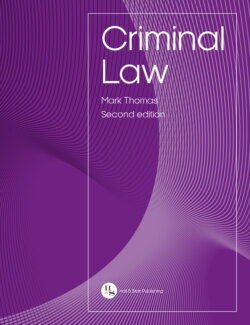Читать книгу Criminal Law - Mark Thomas - Страница 104
На сайте Литреса книга снята с продажи.
2.7.2.1What is the difference between legal and factual causation?
ОглавлениеAt this moment, you may be scratching your head thinking, ‘Well, what’s the difference? They both deal with whether the defendant caused the end result.’ Factual causation, if interpreted literally, is extremely broad, and who amounts to the ‘factual’ cause of harm can be extensive.
example
Jack and Jill live together. It is normal for Jack to drive Jill to work on a daily basis. The two, however, get into an argument and Jack tells Jill to take public transport. Jill does so and is injured when the bus she is riding is involved in an accident.
So, who is the factual cause of harm (ie but for their actions or conduct, Jill would not have been injured):
• the driver of the car involved in the accident (‘but for’ his conduct, Jill would not have been injured);
• Jack (‘but for’ his conduct, Jill would not have been on the bus and thus would not have been injured);
• the bus driver (‘but for’ his driving of the bus, Jill would not have been injured), etc?
The list, as you can see, could go on forever – it could even reach Jill’s parents (ie ‘but for’ Jill’s parents deciding to have a child, Jill would not be alive to be involved in an accident). Naturally, this is nonsensical, and if the ‘but for’ test is applied literally it will often lead to absurd results. Indeed, this was the view taken by the Supreme Court in R v Hughes [2013] UKSC 56 where Lord Hughes gave the following example:
The law has frequently to confront the distinction between ‘cause’ in the sense of a sine qua non without which the consequence would not have occurred, and ‘cause’ in the sense of something which was a legally effective cause of that consequence. The former, which is often conveniently referred to as a ‘but for’ event, is not necessarily enough to be a legally effective cause. If it were, the woman who asked her neighbour to go to the station in his car to collect her husband would be held to have caused her husband’s death if he perished in a fatal road accident on the way home. In the case law there is a well recognised distinction between conduct which sets the stage for an occurrence and conduct which on a common sense view is regarded as instrumental in bringing about the occurrence
To avoid such an absurdity, legal causation steps in to narrow the scope of liability.
Legal causation requires several concepts to be met before the defendant is deemed as the legal cause of harm. These concepts are that the defendant must be:
•the substantial cause;
•the blameable cause; and
•the operative cause.
